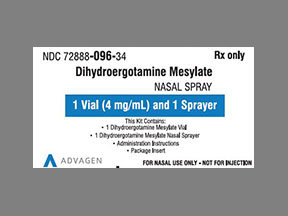
Migranal Coupons & Savings Card – Discount Prices from $36.71
Brand for: Dihydroergotamine
My prescription
Edit
1ML of 4MG/ML, Dihydroergotamine (1 Glass Cont)
Select pharmacy

CVS
$52.96
COUPON PRICE
Walmart
$36.71
COUPON PRICE
Walgreens
$45.06
COUPON PRICE
Albertsons
$48.22
COUPON PRICEMigranal savings card
Show this card to your pharmacist
Walmart
$36.71
BIN
ID
PCN
GRP
019876
LHB252AAC2
CHIPPO
LHX
Powered by
Related ergot derivatives prescriptions
More prescriptions for migraine
Related ergot derivatives prescriptions
More prescriptions for migraine
Price history for Migranal (brand) & Dihydroergotamine (generic)
1 Glass Cont, 1ML of 4MG/ML
Average retail price for Migranal
Average retail price for Dihydroergotamine
Average SaveHealth price for Dihydroergotamine
Our price history data is based on aggregated prescription data collected from participating pharmacies in America. Our prescription data updates daily to reflect the latest price changes. If you notice a missing data point, it means there wasn't sufficient data available to generate a monetary value for that date.
Over the last 12 months, the average discount price of Migranal is $134.42 using the SaveHealth savings card. That's an average savings of 76.55% on Migranal with our discount card.
*Retail prices are based on pharmacy claims data, and may not be accurate when we don't have enough claims.
Migranal (Dihydroergotamine) dosage forms
Dosage Quantity Price from Per unit 1ML of 4MG/ML 1 Glass Cont $36.71 $36.71 1ML of 4MG/ML 2 Glass Conts $70.92 $35.46 1ML of 4MG/ML 3 Glass Conts $105.14 $35.05
| Dosage | Quantity | Price from | Per unit |
|---|---|---|---|
| 1ML of 4MG/ML | 1 Glass Cont | $36.71 | $36.71 |
| 1ML of 4MG/ML | 2 Glass Conts | $70.92 | $35.46 |
| 1ML of 4MG/ML | 3 Glass Conts | $105.14 | $35.05 |
What is Migranal used for?
Migranal is used for the acute treatment of migraine headaches with or without aura in adults. It is not intended for the prevention of migraines or for the treatment of other types of headaches.
How much does Migranal cost?
The cost of Migranal can vary depending on factors such as the pharmacy, location, and whether the patient has insurance coverage. Without insurance, the price can be quite high, often several hundred dollars for a supply. It is advisable for the patient to check with local pharmacies or their insurance provider for the most accurate and up-to-date pricing information. Additionally, some pharmaceutical companies offer discount programs or coupons that may help reduce the cost.
What is the difference between Trudhesa and Migranal?
Trudhesa and Migranal are both medications used to treat migraines, but they differ in their formulation and delivery method. Trudhesa is a nasal spray formulation of dihydroergotamine mesylate that uses a precision delivery system to administer the medication. Migranal, on the other hand, is also a nasal spray but uses a different delivery mechanism. Both medications contain the same active ingredient, dihydroergotamine, but the delivery systems may affect the onset and absorption of the medication.
What is migranal nasal spray?
Migranal nasal spray is a medication used to treat acute migraine headaches with or without aura. It contains dihydroergotamine, which works by narrowing blood vessels around the brain and reducing the effects of substances in the body that can trigger migraine symptoms. It is not intended for the prevention of migraines or for other types of headaches.
What is the composition of Migranal?
Migranal is composed of the active ingredient dihydroergotamine mesylate. It also contains inactive ingredients such as caffeine, dextrose, and carbon dioxide.
